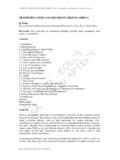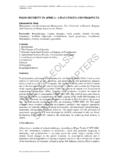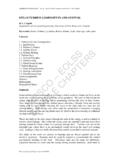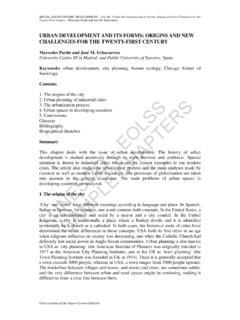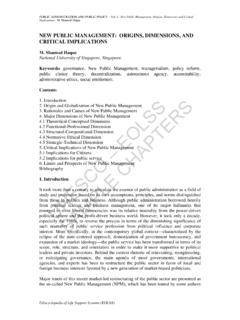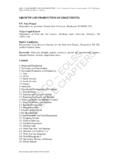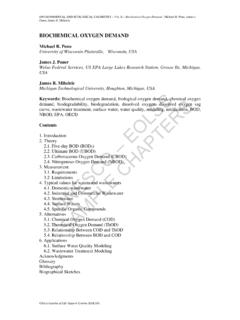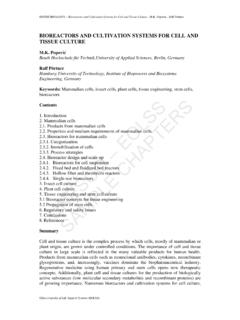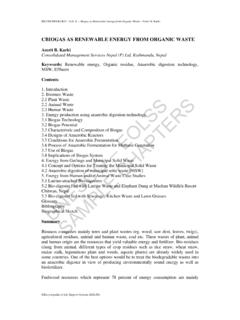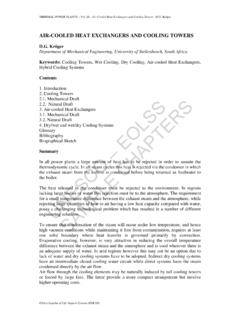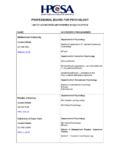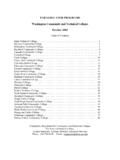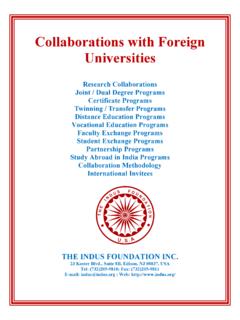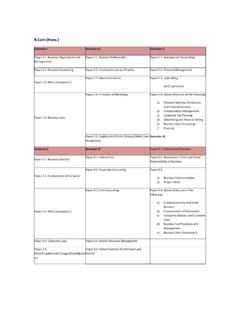Transcription of Interviewing and Observation - ENCYCLOPEDIA OF LIFE ...
1 UNESCO EOLSSSAMPLE CHAPTERSPSYCHOLOGY Vol. II - Interviewing and Observation - Huon ENCYCLOPEDIA of Life Support Systems (EOLSS) Interviewing AND Observation Huon School of psychology , University of New south Wales, Sydney, Australia Keywords: Unobtrusive Observation , systematic Observation , ethical considerations, reactivity, clinical Interviewing , selection interviews, focus group interviews, Interviewing children, training in Interviewing , interview reliability and validity Contents 1. Introduction 2. Observation Systematic Observation Ethical Considerations Strategies Used in Field Settings Operationalization of Behavioral Observation Method Specification for Observation Scientific Adequacy Reactivity 3.
2 Interviewing Historical Overview Survey Interviews Usability Interviews Focus Group Interviews Interviewing in Clinical Contexts Selection Interviews Cognitive Interviewing Interviewing Children Interviewing as Skilled Social Interaction Training in Interviewing Scientific Adequacy of Interviews Interview Reliability Interview Validity Continuing Debates Glossary Bibliography Biographical Sketch Summary We all observe the social world to guide our actions, and to react to other people. Psychologists observations differ from those of lay people; they are purposeful and systematic.
3 Almost all psychologists observe human behavior, but for some Observation refers to a systematic way of collecting data. As is always the case in research, psychologists need to resolve important ethical issues before they can embark on any project that requires them to observe the behavior of other people. Observation is most commonly used in field settings, with such strategies as the street theater and UNESCO EOLSSSAMPLE CHAPTERSPSYCHOLOGY Vol. II - Interviewing and Observation - Huon ENCYCLOPEDIA of Life Support Systems (EOLSS) accosting paradigm. The operationalization of the behavior and the specification of the details of the methods to be used are important tasks that need to be completed in preparation for behavioral Observation .
4 The interview is used widely in psychology as a data collection tool, essentially when the relevant information cannot be observed directly or be obtained easily by means of psychometric tests or questionnaires. The social survey is probably the best-known form of interview, although focus groups now often provide the context within which social surveys are conducted. While the survey is fairly regimented, and typically follows a strict order of presentation of the interview questions, focus groups involve carefully planned discussions. The interview is also the oldest data collection method used by mental health practitioners, although its nature and form have changed across time.
5 In industrial and organizational contexts interviews are widely used for selection purposes. Recent research attention has focused on improving interviews with children. Whatever the purpose, interviews constitute a form of skilled activity, for which training is required. The skills can be taught effectively within relatively short periods. The scientific adequacy of Observation and Interviewing is determined as for other assessment methods, that is, via their reliability and validity. 1. Introduction To carry out research effectively, investigators must have a clear idea about the purpose of their investigation.
6 Different research purposes require different strategies. Although methodological issues are sometimes dealt with in the abstract, they are inextricably intertwined with the theoretical and substantive issues involved in any research undertaking. The emphasis that psychology has given to empirical data has been one of its major strengths. It has, however, also been a source of many controversies. Important debates in psychology often focus on whether the data from a particular study have been reliably and validly collected, appropriately analyzed, and correctly interpreted.
7 The importance of these issues is perhaps nowhere more intensely debated than when Observation and Interviewing are the methodologies used for data collection. 2. Observation All of us, whatever society we live in, are constantly making observations of the social world around us. Such observations guide our own actions, and they shape our reactions to the behavior of other people with whom we interact. They also generate the body of information that is shared by lay people and that is often referred to as commonsense or cultural knowledge. Psychologists are concerned with human behavior. Their investigations often require them to observe the behavior of humans.
8 Sometimes the observations are of gross behaviors (for example, friendly interactions among children in the school playground). At other times, psychologists observations are undertaken in a laboratory setting and focus on smaller units of behavior (for example, the speed with which people recognize UNESCO EOLSSSAMPLE CHAPTERSPSYCHOLOGY Vol. II - Interviewing and Observation - Huon ENCYCLOPEDIA of Life Support Systems (EOLSS) a word that is presented on a video screen). Whatever their nature or purpose, however, the observations made by psychologists differ from those we make in our everyday lives in two important respects.
9 First, psychologists observations are purposive. They are prompted by a desire to shed light on specific research questions. Although sometimes that might involve the description or classification of a phenomenon, more often the goal is to confirm hypotheses. Despite their diverse intellectual traditions and aims, psychologists who use Observation rarely begin with the vague musings of lay people, and instead usually approach their problems with a fairly specific research question. A second important feature of psychologists observations is their systematic nature.
10 While there are different viewpoints about the desirability of standardizing observational procedures, psychologists nevertheless make considered decisions about the way they will undertake their observations. Some psychologists, typically those who employ qualitative methodologies, impose minimum restrictions and controls. Others identify with great specificity the behavioral categories that are to be observed, and derive elaborate sampling and coding systems that will allow them to do so. The principal strength of the first approach is that it avoids any interference with the natural sequence of behavior.
